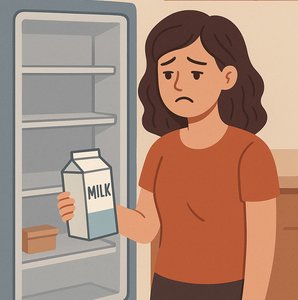| Verbo frasal | Significado principal |
|---|---|
be out of [biː aʊt əv] | quedarse sin algo |
Otros significados
- ya no participar en algo
- haber salido de un lugar o situación
- estar ausente temporalmente
Ejemplos de frases con Phrasal Verb "be out of"
- We are out of milk. — se nos acabó la leche.
- She is out of the project now. — ya no participa en el proyecto.
- He was out of the office all morning. — estuvo fuera de la oficina toda la mañana.
- They are out of the competition. — están fuera de la competencia.
- I am out of ideas. — me quedé sin ideas.
Características de uso "be out of"
Se usa principalmente para indicar que algo se ha terminado o agotado. También puede expresar que alguien está ausente o ha dejado de participar. Su sentido exacto depende del contexto, pero casi siempre implica falta o salida.
Otros phrasal verbs con el verbo be
be back
volver
be away
estar ausente
be in
estar en casa, estar presente
be against
estar en contra
be on
tener lugar
be over
terminar
be behind
llegar tarde
be for
estar a favor de
be out
estar ausente, no estar en casa
be into
interesarse (por)
be about to
a punto de (hacer algo)
be down
no funcionar
be up
estar despierto; no dormir
be after
buscar
be off
irse, salir
be with
apoyar o estar de acuerdo con alguien
be along
llegar pronto
be through
haber terminado algo
be up to
estar haciendo algo (a menudo en secreto)
🔗 Aprende más sobre el verbo irregular be, incluyendo sus formas y uso.




















